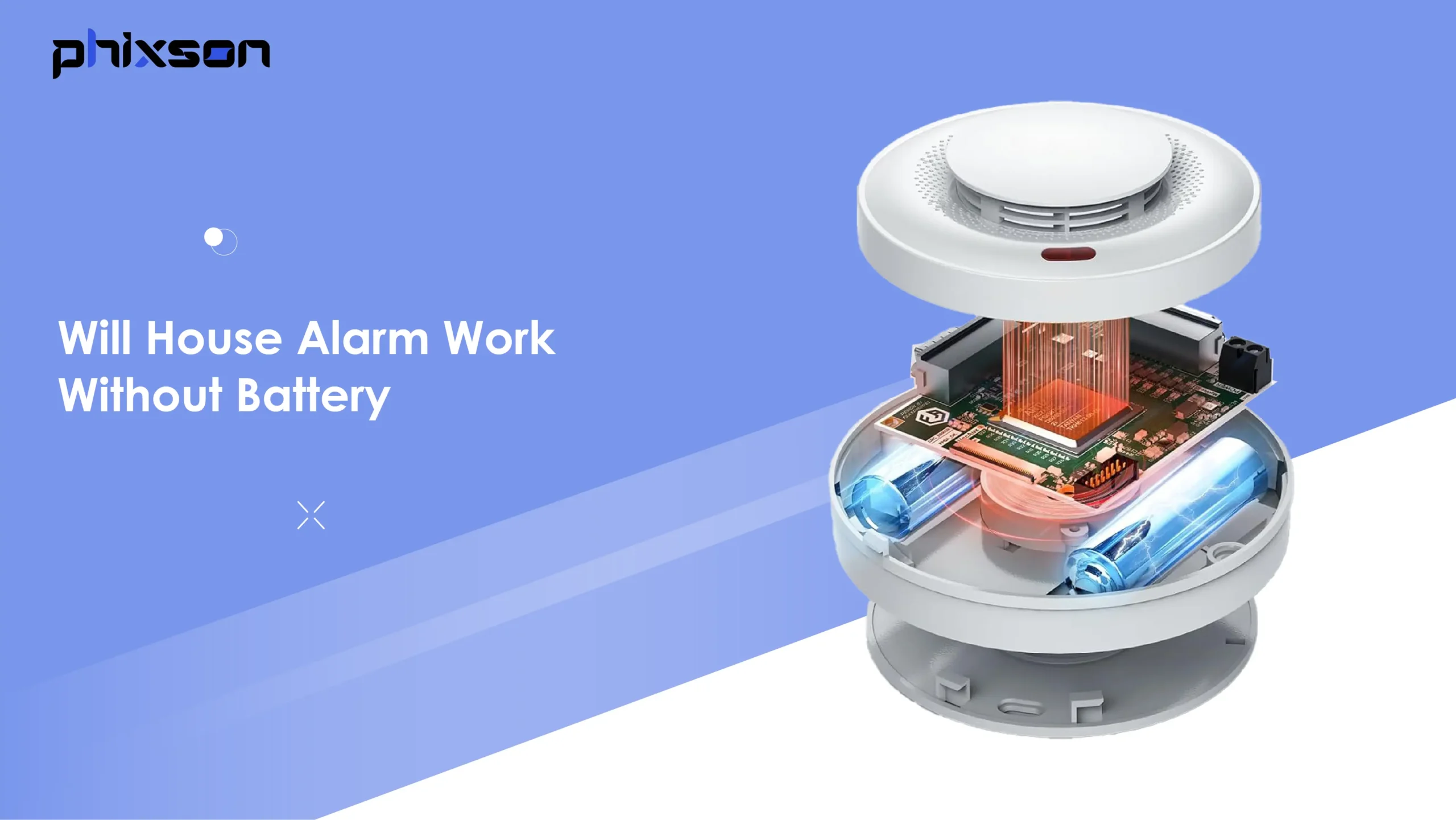L'alarme de maison fonctionnera-t-elle sans batterie? Cela dépend du type de système d'alarme. Ce blog explorera profondément ce problème.
Configurations du système d'alarme typique
La plupart des ménages utilisent des systèmes d'alarme câblés, qui connectent les capteurs à un panneau de commande central par le câblage physique. Cette configuration offre des performances fiables et une résistance aux interférences externes.
Certaines maisons choisissent les systèmes d'alarme sans fil où les capteurs communiquent avec le panneau de configuration via des signaux sans fil. Cette configuration simplifie l'installation et la relocalisation, Le rendre idéal pour les locataires ou les ménages qui réorganisent fréquemment leurs espaces de vie, comme les systèmes basés sur le wifi.
Il existe des types de configuration qui combinent des capteurs câblés et sans fil. Il offre non seulement la stabilité des systèmes câblés ainsi que la flexibilité du système sans fil.
La plupart des systèmes d'alarme ont des batteries de sauvegarde
Les systèmes filaires traditionnels incluent généralement des batteries de secours avec 12 volts et une durée de vie de quatre ans. S'il y a des pannes de courant fréquentes, Nous avons besoin de plus de remplacement. Ces batteries ne durent généralement que 4-6 heures, Pourtant, les pannes de courant moyenne actuelles dépassent 7 heures.
L'alarme de maison fonctionnera-t-elle sans batterie?
Pendant les pannes, La fiabilité du système dépend de la disponibilité de la puissance de type et de sauvegarde. Les systèmes traditionnels et les systèmes cellulaires restent fonctionnels pendant les pertes de puissance. Cependant, Les systèmes VoIP et WiFi / Ethernet s'avèrent plus vulnérables. Une fois les batteries épuisées, Les systèmes cessent les alarmes de fonctionnement et de déclenchement.
Quand remplacer une batterie du système d'alarme
Le synchronisation du remplacement de la batterie a des questions pour les systèmes câblés et sans fil.
Âge
Les batteries du système d'alarme durent généralement entre deux et cinq ans. La performance diminue progressivement avec le temps, conduisant potentiellement à des temps de réponse plus lents ou des dysfonctionnements du système. Les contrôles de statut réguliers et la sensibilisation à la durée de vie servent de mesures préventives cruciales.
Avertissement de batterie faible
Les voyants de moniteur pour les besoins de remplacement. Les systèmes modernes présentent des indicateurs d'état de la batterie qui signalent des conditions de faible puissance. Tandis que les indicateurs varient d'une marques et des modèles, Ils clignotent ou restent généralement éclairés aux utilisateurs d'alerte. Une action immédiate devient nécessaire en voyant ces signaux.
Pavé bip
Le bip persistant des claviers d'alarme indique généralement des batteries presque épuisées nécessitant un remplacement.
Votre clavier affiche-t-il “BATTE” ou “Batterie”?
Certains claviers montrent “BATTE” ou “Batterie” Pour indiquer une faible puissance. Les systèmes avancés peuvent envoyer des SMS ou des notifications par e-mail, nécessitant une configuration de coordonnées appropriée. Certains modèles affichent l'état de la batterie via des applications mobiles ou des alertes d'assistant vocal.
Comment se préparer à une panne de courant
Les systèmes d'alarme domestique modernes comprennent des batteries de sauvegarde pour les pannes. La durée varie en fonction de la capacité de la batterie et des exigences d'alimentation du système. Envisagez d'acheter des batteries ou des dispositifs de charge supplémentaires comme sources d'alimentation supplémentaires. Aussi, Veuillez nous familiariser avec les opérations du système manuel pour les situations d'urgence.
Qu'arrive-t-il au système de sécurité s'il y a une panne?
Les systèmes dépendant uniquement de l'énergie électrique sans sources de sauvegarde cessent de fonctionner pendant les pannes, affectant les caméras, alarmes, et contrôles d'accès, Création de vulnérabilités de sécurité.
Les systèmes de sécurité modernes intègrent des sources d'alimentation de sauvegarde qui maintiennent automatiquement le fonctionnement pendant les pannes. La durée de fonctionnement dépend de la capacité de sauvegarde et de la consommation du système.
Pendant le fonctionnement de l'alimentation de sauvegarde, La plupart des fonctions de sécurité continuent normalement – Enregistrement des caméras, déclencheur d'alarmes, et fonction des contrôles d'accès. L'accès à distance peut être affecté par les perturbations du réseau. Les pannes prolongées épuisent finalement la puissance de sauvegarde, conduisant à une fermeture du système.
Que dois-je faire lorsque mon système éteint?
- Vérifiez la cause de la panne. Vérifiez les notifications communautaires pour la portée de la panne et le temps de restauration estimé. Pour des pannes brèves ou localisées, attendre la restauration de l'énergie. Pour des situations étendues ou peu claires, Inspecter les prises et les disjoncteurs.
- Vérifiez la source d'alimentation de sauvegarde du système de sécurité. De nombreux systèmes modernes incluent des batteries pour un fonctionnement continu pendant les pannes. Surveillez les niveaux de puissance de sauvegarde restants.
- Avec une puissance de sauvegarde épuisée ou absente, Nous utilisons des lampes de poche ou de l'éclairage d'urgence pour un mouvement sûr. Vérifiez manuellement la sécurité des portes et des fenêtres pour éviter les intrusions.
Types de systèmes d'alarme qui fonctionnent pendant une panne de courant
Les systèmes d'alarme câblés avec une sauvegarde intégrée passent automatiquement à passer à la batterie pendant les pannes, Maintenir le fonctionnement des alarmes, capteurs, et caméras. Ces systèmes offrent une grande fiabilité et stabilité, indépendamment des conditions de réseau électrique.
Les systèmes d'alarme sans fil gagnent en popularité en utilisant Wi-Fi IdO Technologie pour la transmission du signal d'alarme, RESTANT RESTANT pendant les pertes de puissance. Ils peuvent transmettre des alertes sur les stations de surveillance centrales ou les appareils mobiles via des ondes radio ou réseaux cellulaires Malgré les pannes de courant.
